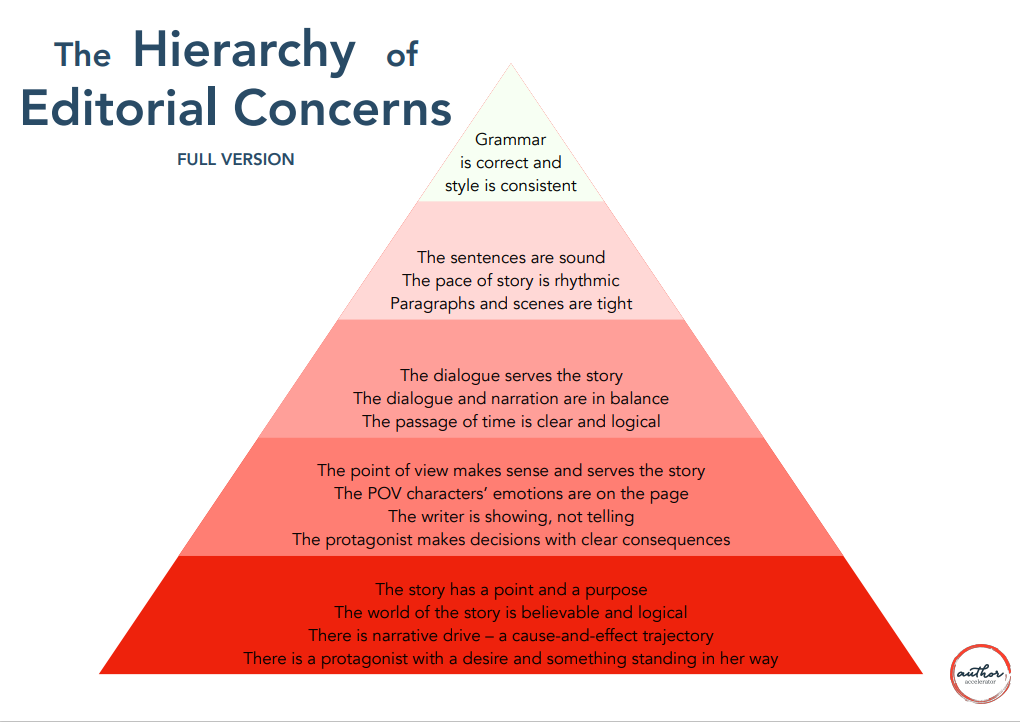Your Writing Group: Tip #2
As an Author Accelerator certified book coach, I use AA’s Hierarchy of Editorial Concerns as a rough guide to my feedback for clients.
For my blog post about writing groups (Tip #1: Know What You Want from a Group), I did some casual research with several writer friends to learn more about how their groups operate and what they get out of them.
Then I took my research a step further. I created a simple, unscientific poll in the KidLit411 Facebook group, which has about 15,000 members.
I asked MG and YA novelists what they most want from a writers’ group. They chose their top 2 or 3 from these options: accountability, fellowship, writing and publishing info, and feedback. 87 people responded.
Here’s how they answered:
Accountability: Having a regular deadline—26%
Fellowship with other writers—35%
Writing and Publishing Info: Sharing tips—8%
Feedback on your work—29%
How does that match up with your own choices and priorities?
While I love to talk with fellow writers one-on-one, fellowship is not the top priority for this super introvert. These days, feedback and accountability would be my #1 and #2.
And speaking of feedback, that is one place where writing groups can be both marvelous and distressing.
So how can you have a marvelous experience more often than not?
Tip #2: Prime Your Readers for What You Need
Giving useful feedback on work-in-progress fiction is tough. Receiving feedback can be tough too.
The more focused and specific you can be about what you need—and what you don’t—the more likely you are to receive feedback that will be helpful for you.
Line edits—yea or nay?
It’s way easier for writing group members to give feedback about the simple things: typos, word choice, sentence structure. In other words, line editing.
If you’re still figuring out major story elements, maybe adding and deleting whole scenes, then line editing isn’t all that useful. In which case, tell your readers you’re not ready for line editing yet.
On the other hand, if you’re wrapping up a final revision, copyediting/polishing feedback like this can be fabulous.
Feeling fragile?
If your story is feeling fragile, yet you still need a bit of feedback, ask your readers this: Are you interested enough to keep reading?
Then when you meet with your group, lead a conversation about what is keeping them interested in the story (and why) or where the story dragged (and why).
Their explanations may give you some clues about what’s working or not.
Get specific and analytical
When you want more detailed feedback on your story, consider identifying a couple of specific elements for your readers to focus on—like characters or plot.
Having a specific focus will help direct your readers’ attention. It feels manageable to respond to a question about how the antagonist comes across or whether the climax feels earned.
Having a little direction for their responses helps readers become sharper critiquers. It also helps you think more strategically about your story choices.
Writers aren’t born knowing how to give effective feedback to each other. We have to learn it.
How do you balance honesty with kindness?
This is what I strive to do and what most kid lit writers I’ve ever met try to do too. It takes practice.
I’ve gotten pretty good at helping writers bridge the gap between where they are with their manuscript and where they want to go. It’s a joy and a privilege to help writers accomplish their writing goals.
If honest, personalized feedback sounds like something your story needs, I invite you to schedule a free Zoom call with me.
